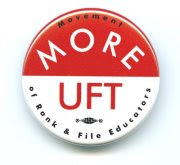By eliminating teacher tenure, we risk further
disconnecting students and teachers, and make it harder for them to have
transformational dialogue about what actually needs to be done in our
classrooms to further the growth of students... Primi Akhtar (2014 graduate of Queens Metropolitan High School, valedictorian)
Real parents and students as opposed to astroturf creations support tenure. Primi was a student of Beth Kuhlman who is married to Jeff Kaufman.
Our pals at MORE have been busy bees despite the summer vacation.
Teacher Tenure Is Good For Students
-
FOR IMMEDIATE RELEASE: July 30, 2014 Press Contacts: Jia Lee, Elementary
School teacher and Public School parent Mike Schirtzer, Social Studies High
School...
FOR IMMEDIATE RELEASE: July 30, 2014
Press Contacts:
Jia Lee, Elementary School teacher and Public School parent
Mike Schirtzer, Social Studies High School teacher
Teachers, Parents and Students Stand Strong for Tenure
Due Process Protects Teachers who Protect their Students
Tenure gives teachers the right to stand up for their
students’ best interests, even in the face of poor leadership or poor
policy. It accords those who spend the most time with students the
respect and responsibility of making best decisions on their students’
behalf. Thus, recent attacks on tenure have nothing to do with improving
teaching and learning. They are designed to undermine teacher’s unions
and silence educators’ voices.
Critics who claim, ‘tenure is a job for life’ or ‘tenure
protects incompetent teachers’ are misrepresenting the facts. It takes
several years to earn tenure in New York State, and in reality, tenure
is nothing more than due process. It provides only two job protections:
1) a school district must have cause for terminating a teacher and 2) an
independent agent ultimately decides whether or not the teacher is
fired.
Attacks on tenure are cloaked in civil rights language and
claim to defend children from incompetent educators. In reality, there
is no evidence showing that tenure harms children. In fact, states that
afford teachers tenure, like Massachusetts, consistently show higher
student achievement levels than states like Mississippi, where teachers
do not have tenure. (
According to nationwide NAEP scores.)
Tenure allows educators to blow the whistle on violations
that harm our children. This can include advocating for students with
special needs who have been deprived of proper services.
Karen Sprowal, a public school parent says, “The
argument is always about the “bad apples” when speaking about teacher
tenure. As a parent of an often under-served specials needs child, for
the sake of “budget cuts”, or so I have been told, I can tell you that
all of the most fierce student advocate teachers were always tenured.
The teachers that weren’t tenured always remain silent for fear of being
fired or removed if they spoke out about any inequities. In fact it got
so bad at my son’s school that we couldn’t even get non- tenured
teachers to participate on School Leadership Team because of the
principal’s mere presence.”
Students from the New York City Student Union agreed that
campaigns focused on eliminating teacher tenure do more harm than good,
and divert attention from more pressing issues facing our educational
system.
“By eliminating teacher tenure, we risk further
disconnecting students and teachers, and make it harder for them to have
transformational dialogue about what actually needs to be done in our
classrooms to further the growth of students. Both students and
teachers are being exploited by a system at large. Our energies are used
to profit large corporations that dictate our education–both students
and teachers deserve rights that will not put them at risk of being
removed, silenced, or further marginalized. Our energies and resources
ought to be used to grow our educational communities, not put towards
extra policing efforts.”
-Primi Akhtar (2014 graduate of Queens Metropolitan High School)
At the heart of the attacks on tenure is an attempt to
silence educators from speaking out against “reform” policies that
privilege data and profits rather than children. Far too many public
education decisions are made in corporate boardrooms and political
back-rooms, without the input of the real stakeholders, parents and
educators. The educators of MORE-UFT have worked to expose and change
these policies. Any erosion of tenure will silence a great many of our
voices. This will surely quicken the damage that is being done to our
public schools.
Jia Lee, parent, teacher, and
conscientious-objector to this year’s standardized testing regime
explains, “Tenure is a threat to those who stand to gain from
privatizing public education. Tenure allows educators to establish
democratic practices in our schools, such as consultation committees,
without worrying about being targeted for bringing up issues that
directly impact the well-being of our students. When we recognize that
the market based reforms of Common Core Standards and high stakes
testing place a stranglehold on our ability to provide our students with
what they need, we should not be fearful of speaking out. Advocacy for
students’ needs begins with a teacher’s ability to teach without fear.”
In 1964, tenure allowed eight city teachers, including
Sandra Adickles, to ride south on a voluntary transfer and teach at a
‘freedom school’ during the Civil Rights Movement. Ms. Adickles’ bravery
later led to a US Supreme Court decision making it more difficult for
southerners to deny rights under the Equal Protection Clause of the US
Constitution. Teachers like Ms. Lee, and Ms. Adickles help make our
country stronger and more equitable, and tenure makes their brave
actions possible.
Tenure is essential in protecting the best of our
profession, because it allows us to speak freely and advocate for our
students, ourselves, and our communities.
Please see our full statement “In Support Of Tenure”
here
is the social justice caucus of UFT. We are a group of working public
educators and parents, that stand firmly for tenure and independently
arbitrated due process rights, including seniority rights, for all
educators.










 James Eterno response:
James Eterno response: 




